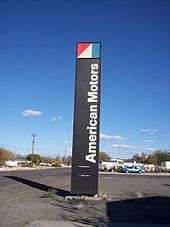IKA-Renault Torino
| IKA-Renault Torino | |
|---|---|
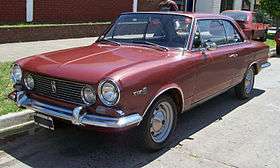 IKA Torino 380 coupé (1966-1970) | |
| Overview | |
| Manufacturer |
IKA (1966-1977) Renault Argentina (1978-1982) |
| Production | 1966–1982 |
| Assembly | Santa Isabel, Córdoba Province |
| Designer | Richard A. Teague and Pininfarina |
| Body and chassis | |
| Class | Mid-size |
| Body style |
2-door hardtop coupé 4-door sedan |
| Layout | FR layout |
| Related | Rambler American |
| Powertrain | |
| Engine |
2.96 L (181 cu in) I6 Tornado Special |
| Transmission |
4-speed ZF manual 3-speed ZF manual |
| Dimensions | |
| Wheelbase | 107.2 in (2,723 mm) |
| Length | 4,724 mm (186.0 in) |
| Width | 1,798 mm (70.8 in) |
| Height | 1,410 mm (55.5 in) |
| Curb weight | 1,060 kg (2,337 lb)-1,471 kg (3,243 lb) |
The IKA Torino, later Renault Torino, is a mid-sized automobile made by Industrias Kaiser Argentina (IKA) under an agreement with American Motors Corporation (AMC) in 1966. The 1966 Torino was IKA’s first integral national product and IKA was eventually bought out by Renault in 1975 to form Renault Argentina S.A. The Torino was built on the same hybrid AMC platform all the way through 1981 in both two-door hardtop and four-door sedan variants. It has been called Argentina's national car.
Design

From its inception by Kaiser Motors and the Argentinian government in 1955, IKA assembled vehicles that were designed elsewhere. By 1962, management wanted an automobile that would be better suited to their domestic market, one that "combined American ruggedness and European style."[1] IKA and American Motors had signed an agreement for development and production of such a car in Argentina.[2]
The Torino was developed by IKA as an Argentine hybrid of AMC's 1964-'65 Rambler American and Classic with exclusively designed front and rear body panels, bumpers and interior. The central body section is from the Classic, and the engine and trunk compartments are derived from the American. Rooflines came from the American as well, and some later Torino sedans featured the attractive "C" pillar that was used in 1968-69 U.S. American sedans. The rear coil suspension was borrowed from the Classic, albeit with a four link setup rather than a torque tube. One unique feature is the Torino's front unibody "frame rails" borrowed from the Classic convertible (also used in the 1965-'66 Marlin). They are longer than the American, extending all the way back under the car to the front of the rear rails. This made for a stiffer chassis, better adapting the car to the rougher road conditions of Argentina at the time. The Torino rode on a slightly longer wheelbase (than the American) by one inch - 2723 mm (107-inch). Although the engines were not obtained from American Motors, the vehicle's basic AMC platform continued throughout its lifetime.[3] As upgrades were incorporated over the years, such as AMC's flush door handles, the Torino became mostly a product of Argentina with few imported parts.

The car's badging is based on the city of Turin's coat of arms. The symbol is a bull standing on its two hind legs, mimicking the prancing stallion symbol of Ferrari. The Argentine car's front end, rear fascia, and interior were redesigned by Italian auto stylists at Pininfarina to give it a more European look, as well as to make the Torino more appealing to the Argentine public and less like an American car. With the added exterior styling touches, as well as its unique trim and luxurious interior appointments, and Argentine built Kaiser-Jeep OHC six, the Torino was truly a product of Argentina.
The Torino debuted on 30 November 1966, at the Municipal Racing circuit of Buenos Aires (which was used for the Formula One World Championship race annually).
Available initially was a high-performance version, the Torino 380 W, with three Weber two-barrel carburators, low exhaust restriction and other minor changes in engine specifications producing 176 hp (131 kW; 180 PS). A floor mounted shift ZF four-speed manual transmission, front disc brakes, a Lucas electronics fully gauged wooden instrument panel and leather appointments were standard.
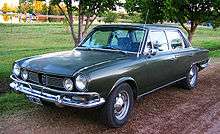
Between 1970 and 1976, the Torino was sold as a "luxury vehicle". Famous owners included Fidel Castro, Leonid Brezhnev, Muammar al-Gaddafi.[4] and Juan Manuel Fangio.
From 1977, the top model became the Torino Grand Routier, a touring sedan. The entire range received some sheetmetal and design changes in 1978, (when IKA became Renault Argentina) though major panels such as the doors were carried over. The newer models are slightly longer and the later sedans can be recognized by their full C-pillar. Previously the rear window wrapped more into the sides.
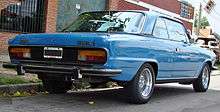
In its heyday there were over twenty versions, but in its final year, the Torino was only available in two models (Grand Routier GR sedan and ZX coupé). When production was ended by Renault in 1982, it was "a dark year for fellow car enthusiasts in Argentina."[5] By the early 1980s, the smaller front-wheel drive Renault 12 was the best seller.[6]
Engines
All engines are Argentina manufacturing Torino.
- Tornado Special engine (only avaible on the 300/300S):
- Bore X Stroke: 84.94mm x 87.31mm
- Displacement: 2968 cm3
- Power: 120 HP at 4500 RPM and 3000 RPM mkg 26
- Top RPM: 5000 RPM
- Number of caucuses : 4
- Tornado Interceptor engine (Avaible Models 380, 380W, TS, SE, GS200):
- Bore X Stroke: 84.94mm X 111.125mm
- Displacement: 3770 cm3
- Top RPM: 5000 RPM (5200 380w)
- Number of caucuses : 4
- Power:
- 380: 155 hp at 4300 rpm and 32 mkg at 3500 rpm
- 380W: 185 hp at 4500 rpm and 33 mkg at 3500 rpm (The W is for the 3 weber 45 Dcoe 17 carburetors)
- TS: 160 hp at 4500 rpm and 31 mkg at 2500 rpm
- SE: 152 HP at 4200 rpm and 30 mkg at 2500 rpm
- GS200: 215 hp at 4700 rpm and 34 mkg at 3500 rpm *(The gs 200 is the replacement of 380w and was the first Argentine car exceed 200 km / h (203 km/h))
The Torino 233 engine have a new block with 7 caucuses and new cylinder head.
- Torino 233 engine: (Avaible Models SE, TS, TSX, GS, ZX, ZX´82)
- Bore X Stroke: 84.94mm x 111.125mm
- Displacement: 3820 cm3
- Top RPM: 5000 RPM
- Number of caucuses : 7
- Power:
- SE: 170 hp at 4500 rpm and 31 mkg at 2500 rpm
- TS: 180 hp at 4700 rpm and 31 mkg at 2500 rpm
- TSX: 200 hp at 4500 rpm and 33 mkg at 3000 rpm
- GS: 215 hp at 4700 rpm and 34 mkg at 3200 rpm (supposedly)
- ZX: 200 hp at 4500 rpm and 33 mkg at 3000 rpm
- ZX´82: 220 hp at 4500 rpm and 35 mkg at 3000 rpm (supposedly)
The Tornado Interceptor 241 engine: It was an engine that was prepared for use in competition only available in torino 380wTC.
- Tornado Interceptor 241 engine:
- Bore X Stroke: 86.70 x 111.125
- Displacement: 3950 cm3
- Top RPM: 5400 RPM
- Number of caucuses: 4
- Power: 248 hp at 5000 rpm and 39 kgm at 4000 rpm
Racing
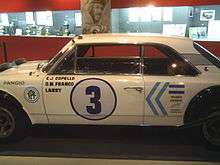
The IKA Torino's most notable international success was in the 84-hour Nürburgring race of 1969, with a Torino finishing in fourth place.[7] The factory shipped three cars to Germany and after the three and a half days of racing, the No. 3 Torino driven by Eduardo Copello, Alberto Rodriguez Larreta, and Oscar Mauricio Franco, had covered the most laps of all - 334, but lost the top position because they accumulated various penalties during the race.[8] The IKA Torino became "the pride and joy of Argentine car enthusiasts" when their country's team "showed that it could run with the best of Europe on Europe’s toughest circuit."[8] The No. 3 car is displayed in the Juan Manuel Fangio Museum located in Balcarce, Buenos Aires Province, the birthplace of Argentina's Juan Manuel Fangio who dominated the first decade of Formula One racing.
The IKA Torino won the Turismo Carretera, a popular touring car racing series in Argentina in 1967 with Eduardo Copello, 1969 with Gastón Perkins, 1970 and 1971 with Rubén Luis di Palma.
The Torino is still being raced, albeit in silhouette form with Jeep Cherokee engines, in the Argentinian Turismo Carretera, TC4000, and Turismo Zonal categories.
Legacy
By the late 1970s the Torino was the only non-Renault product manufactured by the French company. It could also be considered the last front-engine, rear wheel drive Renault, a rarity in itself.[9]
Many Argentines think of the Torino as the national car, and it has become popular with the tuning industry. Parts are still available and fan clubs abound.
References
- ↑ Cranswick, Marc (2011). "Torino time with IKA". The Cars of American Motors: An Illustrated History. McFarland. pp. 30–31. ISBN 978-0-7864-4672-8. Retrieved 25 March 2013.
- ↑ "Kaiser Industries in Argentina". oldcarandtruckpictures.com. Retrieved 25 March 2013.
- ↑ "Renault News". autoviewpoint.com. Archived from the original on 13 February 2010. Retrieved 25 March 2013.
- ↑ Martorano, Andrés. "So what's a Torino?". Rambler Rogue Registry. Archived from the original on 3 May 2009. Retrieved 25 March 2013.
- ↑ Martin, Murilee (27 February 2007). "Rambler Rogue? No, Renault Torino!". jalopnik. Retrieved 25 March 2013.
- ↑ "Renault Argentina S.A.". Company Histories. 25 March 2013.
- ↑ de Jong, Frank. "1969 Nurburgring 84hrs". touringcarracing.net. Retrieved 25 March 2013.
- 1 2 Orosz, Peter (8 March 2011). "When Argentina ruled the Nürburgring". jalopnik. Retrieved 25 March 2013.
- ↑ "Renault Torino GR (1982 MY)". carfolio.com. Retrieved 25 March 2013.
External links
| Wikimedia Commons has media related to Renault Torino. |
| American Motors (AMC) road car timeline, United States market, 1954–1987 Eagle » | |||||||||||||||||||||||||||||||||||
|---|---|---|---|---|---|---|---|---|---|---|---|---|---|---|---|---|---|---|---|---|---|---|---|---|---|---|---|---|---|---|---|---|---|---|---|
| Type | 1950s | 1960s | 1970s | 1980s | |||||||||||||||||||||||||||||||
| 4 | 5 | 6 | 7 | 8 | 9 | 0 | 1 | 2 | 3 | 4 | 5 | 6 | 7 | 8 | 9 | 0 | 1 | 2 | 3 | 4 | 5 | 6 | 7 | 8 | 9 | 0 | 1 | 2 | 3 | 4 | 5 | 6 | 7 | ||
| Subcompact car | Metropolitan | LeCar | Encore | ||||||||||||||||||||||||||||||||
| Gremlin | Spirit | ||||||||||||||||||||||||||||||||||
| Compact car | Rambler | Rambler American | Hornet | Concord | |||||||||||||||||||||||||||||||
| Jet | Pacer | Alliance | |||||||||||||||||||||||||||||||||
| Mid-size car | Six and V8 | Six | Classic | Rebel | Matador | 18i/Sportwagon | Medallion | ||||||||||||||||||||||||||||
| Rebel | Marlin | Matador Coupe | |||||||||||||||||||||||||||||||||
| Full-size car | Nash Ambassador | Ambassador | |||||||||||||||||||||||||||||||||
| Hudson Hornet | |||||||||||||||||||||||||||||||||||
| Hudson Wasp | |||||||||||||||||||||||||||||||||||
| Sports car/Roadster | N-H | AMX | AMX | Fuego | GTA | ||||||||||||||||||||||||||||||
| Italia | Javelin | ||||||||||||||||||||||||||||||||||
| Crossover utility vehicle | Eagle | ||||||||||||||||||||||||||||||||||
| SUV | see early timeline of Jeep models | see late timeline of Jeep models | |||||||||||||||||||||||||||||||||
| Military vehicles | Mighty Mite | AM General | |||||||||||||||||||||||||||||||||
| Vehicle sold under Renault marque | |||||||||||||||||||||||||||||||||||
| « previous — Renault car timeline, 1940s–1980s — next » | |||||||||||||||||||||||||||||||||||||||||||||
|---|---|---|---|---|---|---|---|---|---|---|---|---|---|---|---|---|---|---|---|---|---|---|---|---|---|---|---|---|---|---|---|---|---|---|---|---|---|---|---|---|---|---|---|---|---|
| Type | 1940s | 1950s | 1960s | 1970s | 1980s | ||||||||||||||||||||||||||||||||||||||||
| 5 | 6 | 7 | 8 | 9 | 0 | 1 | 2 | 3 | 4 | 5 | 6 | 7 | 8 | 9 | 0 | 1 | 2 | 3 | 4 | 5 | 6 | 7 | 8 | 9 | 0 | 1 | 2 | 3 | 4 | 5 | 6 | 7 | 8 | 9 | 0 | 1 | 2 | 3 | 4 | 5 | 6 | 7 | 8 | 9 | |
| Economy car | 3 / 4 | 4 | |||||||||||||||||||||||||||||||||||||||||||
| Supermini | 5 / 7 | 5 | |||||||||||||||||||||||||||||||||||||||||||
| Small family car | Juvaquatre | Dauphine | 6 | 14 | 9 / 11 | 19 | |||||||||||||||||||||||||||||||||||||||
| 4CV | 8 / 10 | ||||||||||||||||||||||||||||||||||||||||||||
| Large family car | Colorale | 12 | 18 | 21 | |||||||||||||||||||||||||||||||||||||||||
| Executive car | Frégate | 16 | 20 / 30 | 25 | |||||||||||||||||||||||||||||||||||||||||
| Coupé | 15 / 17 | Fuego | |||||||||||||||||||||||||||||||||||||||||||
| Torino | |||||||||||||||||||||||||||||||||||||||||||||
| Roadster | Caravelle | ||||||||||||||||||||||||||||||||||||||||||||
| Sports car | Alpine A610 | ||||||||||||||||||||||||||||||||||||||||||||
| Large MPV | Espace | ||||||||||||||||||||||||||||||||||||||||||||
| Off-roader | Rodeo 4 / 6 | Rodeo | |||||||||||||||||||||||||||||||||||||||||||
| Van | Estafette | Trafic | |||||||||||||||||||||||||||||||||||||||||||
| Master | |||||||||||||||||||||||||||||||||||||||||||||
